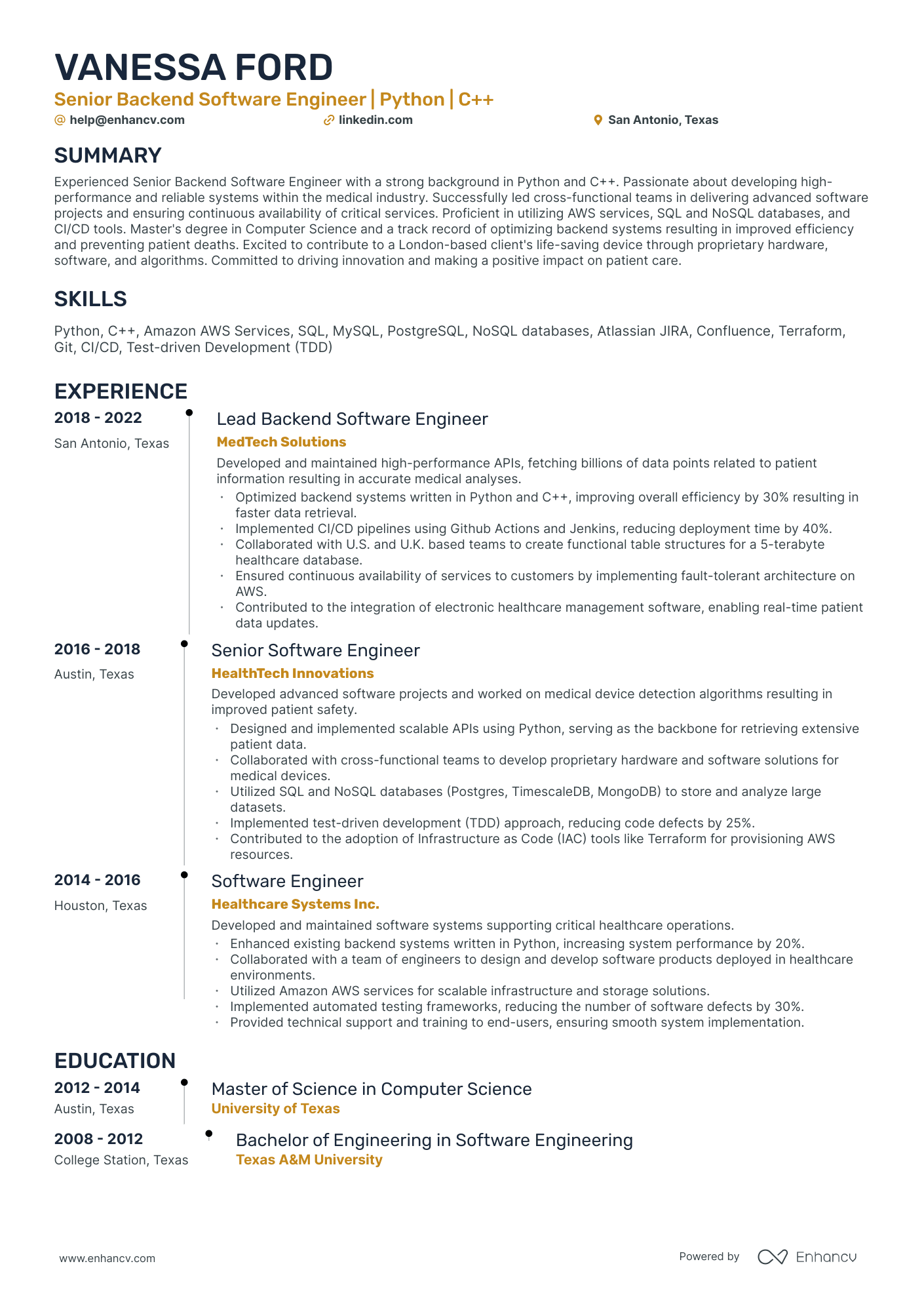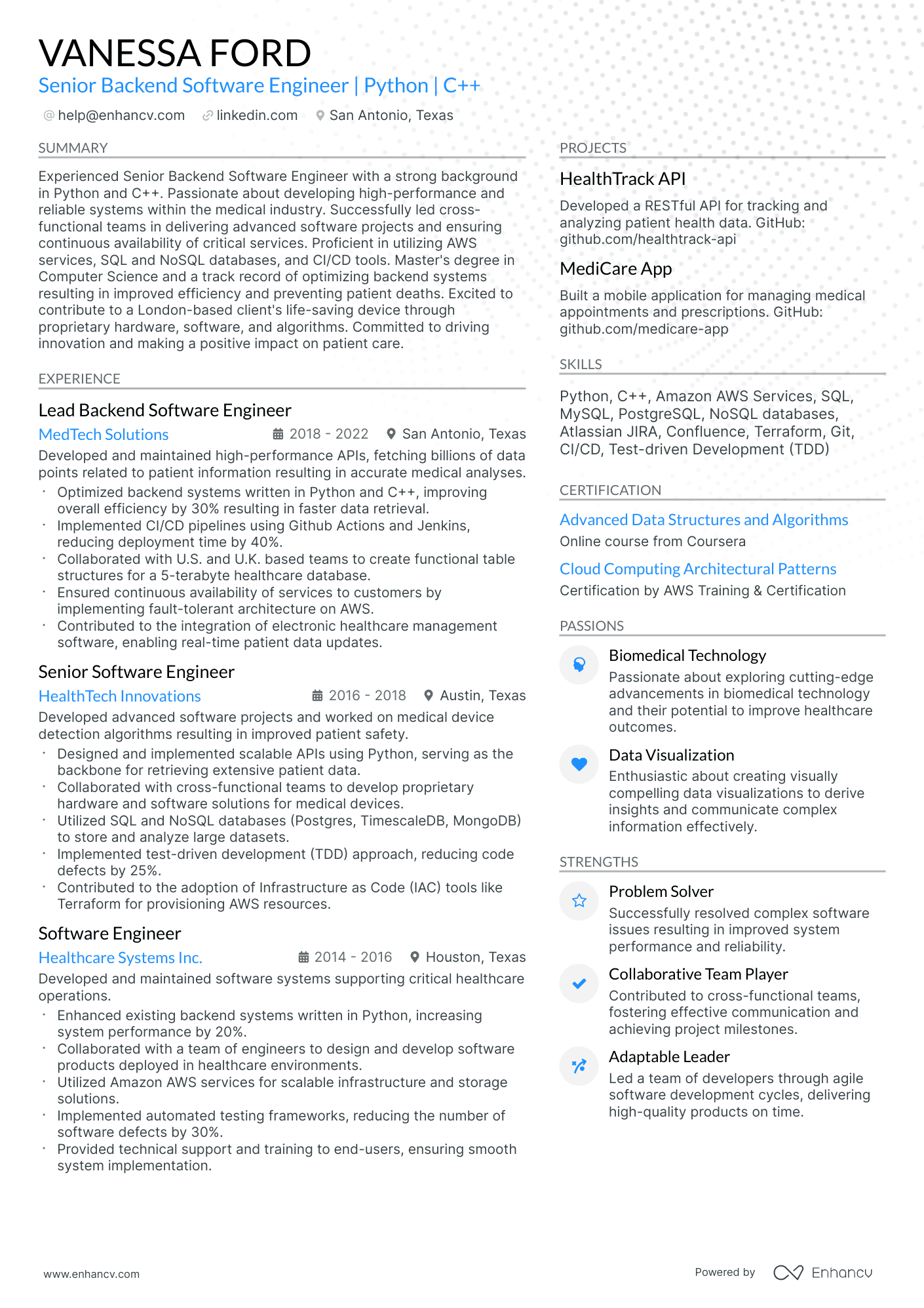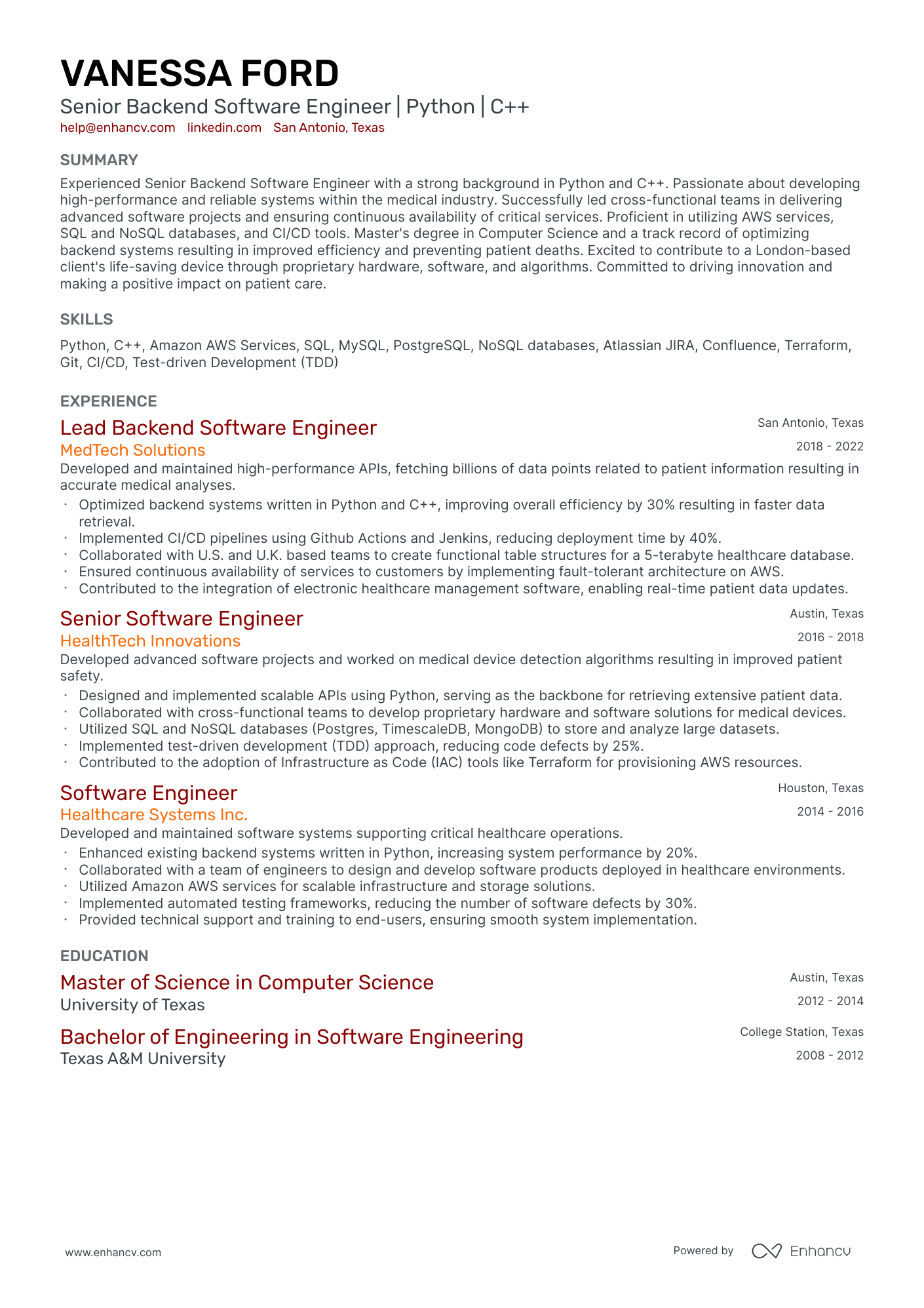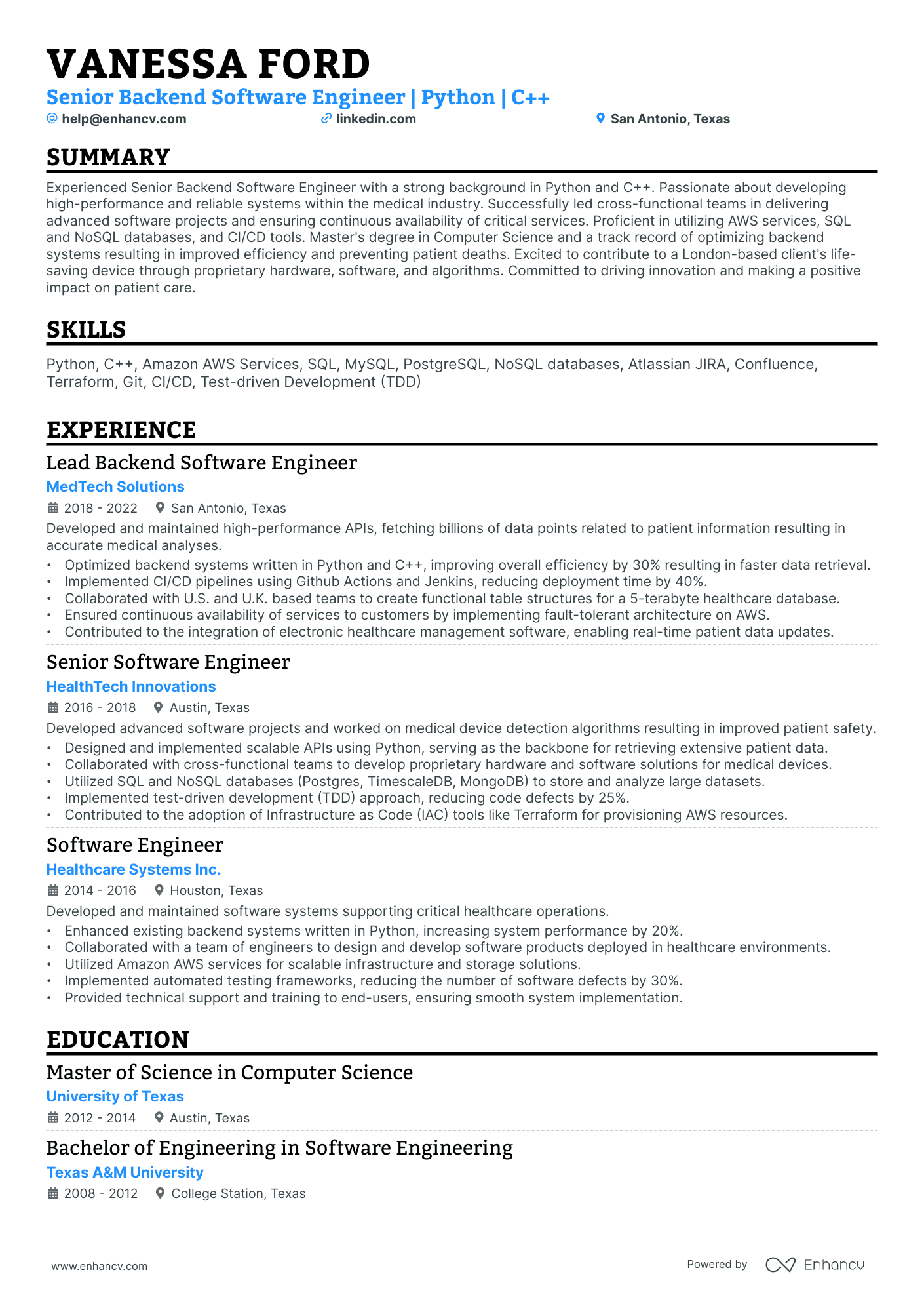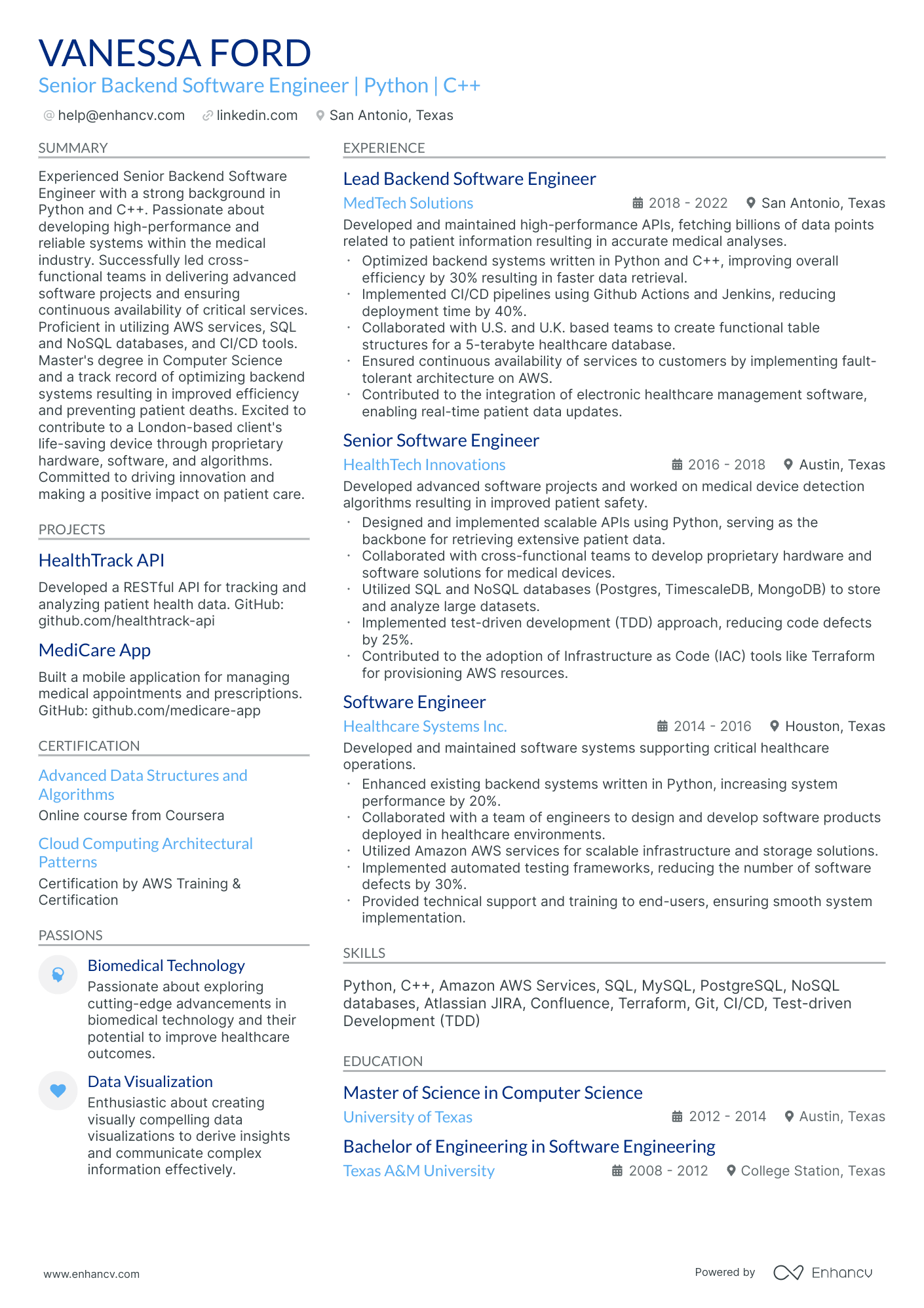One specific challenge faced by a devsecops engineer when crafting their resume is adequately translating their multi-disciplinary skills - a mix of software development, security expertise, and IT operations - into concise, impactful language that effectively communicates their unique value. Our comprehensive guide can assist in addressing this issue by providing specialized advice on how to articulate these complex, intertwined skills and experiences in a clear, compelling manner that resonates with potential employers.
Dive into this guide to uncover:
- Top-tier devsecops engineer resume samples that have successfully landed candidates in leading companies.
- Strategies to direct recruiters' focus towards your standout experiences, notable achievements, and pivotal skills.
- Guidance on crafting resume sections that align closely with the vast majority of job specifications.
- Insights on harmonizing your devsecops engineer technical prowess with your distinct personality, setting you apart from the competition.
Recommended reads:
Tips for refining your devsecops engineer resume format
The resume format sets the stage for your professional narrative. Ensure it:
- Adopts the reverse-chronological format, placing your most recent experiences at the forefront. This format is ideal for those with relevant and up-to-date experience.
- Features a clear headline, making it straightforward for recruiters to access your contact details, portfolio, or current role.
- Stays concise, ideally spanning no more than two pages, focusing on relevant experiences and skills.
- Maintains its layout by being saved as a PDF, ensuring compatibility with Applicant Tracking Systems (ATS).
Upload your resume
Drop your resume here or choose a file. PDF & DOCX only. Max 2MB file size.
Pro tip
If you don't happen to have that much relevant experience for the role, you could select a different format for your resume. Popular choices include:
- functional skill-based resume format - that puts the main focus on your skills and accomplishments;
- hybrid resume format - to get the best of both worlds with your devsecops engineer experience and skills.
Must-have sections on a devsecops engineer resume:
- A header to list your job title and contact information
- A resume summary or objective which highlights your top career achievements
- A detailed experience section where you emphasize the breadth of your expertise
- A skills box to put the spotlight on your social talents and technical strengths
- An education and certifications section which features your qualifications
What recruiters want to see on your resume:
- Experience with DevOps Tools: This includes tools like Docker, Kubernetes, Jenkins, and Ansible. Knowledge of these tools is crucial for automating and streamlining operations and development processes.
- Knowledge of Cloud Technologies: Experience with cloud platforms (AWS, Google Cloud, Azure) is highly sought after as many operations are moving to the cloud.
- Security Expertise: As the role implies, a deep understanding of security principles, practices, and technologies (such as encryption, IAM, network security, vulnerability management, etc.) is essential.
- Coding Skills: Though not always required to the same level as a software developer, a good devsecops engineer will have coding skills in languages relevant to their field such as Python, Java, or Golang.
- Continuous Integration/Continuous Deployment (CI/CD): Knowledge of CI/CD methodologies is important for improving product quality and speed of deployment. Familiarity with related tools such as Jenkins or GitLab CI is often a priority.
Recommended reads:
Optimizing the experience section of your devsecops engineer resume
The experience section is pivotal—it bridges the gap between your qualifications and the job's requirements.
To craft an impactful devsecops engineer experience section, consider these guidelines:
- Review the job posting to identify key requirements and align your past roles with these needs.
- Go beyond listing skills—demonstrate their impact through quantifiable achievements.
- Exclude roles that don't enhance your application or showcase relevant skills.
- While technical expertise is crucial, also highlight soft skills that add value to your role.
- Use action verbs to articulate your accomplishments and the skills employed to achieve them.
Below, we've provided devsecops engineer resume samples to inspire your experience section, ensuring it adheres to industry best practices.
- Implemented security measures to protect sensitive customer data resulting in a 30% reduction in security incidents.
- Collaborated with development and operations teams to integrate security practices into the CI/CD pipeline.
- Conducted vulnerability assessments and penetration testing on web applications, identifying and resolving critical vulnerabilities.
- Automated security testing using tools such as OWASP ZAP and Burp Suite, reducing testing time by 50%.
- Developed and maintained secure infrastructure configurations using tools like Terraform and Ansible.
- Led the implementation of security controls and policies, ensuring compliance with industry standards and regulations.
- Managed security incidents and conducted forensic investigations, resulting in the identification and mitigation of potential risks.
- Developed and delivered security training programs for development and operations teams, improving security awareness.
- Collaborated with cross-functional teams to perform threat modeling and risk assessments for critical systems.
- Designed and implemented a secure multi-factor authentication system for remote access to company resources.
- Architected and implemented a scalable cloud security solution using AWS services, reducing response time by 40%.
- Automated security scanning and monitoring processes, resulting in a 60% increase in vulnerabilities detected and resolved.
- Collaborated with development teams to integrate security testing into the software development lifecycle.
- Conducted code reviews and provided security recommendations to ensure secure coding practices.
- Managed and configured security tools such as WAF, IDS/IPS, and SIEM systems.
- Developed and implemented a comprehensive incident response plan, reducing incident resolution time by 50%.
- Performed regular vulnerability assessments and penetration testing on network infrastructure and applications.
- Implemented security controls in compliance with HIPAA regulations, ensuring the protection of patient data.
- Collaborated with development teams to embed security practices throughout the software development lifecycle.
- Configured and managed security tools like firewalls, antivirus, and intrusion detection systems.
- Designed and implemented a containerized security architecture using Docker and Kubernetes, ensuring secure deployments.
- Built and maintained security pipelines for continuous integration and delivery using Jenkins and GitLab.
- Implemented infrastructure-as-code principles using tools like Terraform and Ansible to enforce security standards.
- Conducted security audits and risk assessments of cloud environments, identifying vulnerabilities and recommending remediation measures.
- Provided security guidance and training to development teams on secure coding practices and secure design principles.
- Implemented a secure log management system using ELK stack, enabling centralized logging and analysis.
- Performed security reviews of third-party vendors, ensuring compliance with data protection regulations.
- Developed and maintained security policies, standards, and procedures for the organization.
- Collaborated with cross-functional teams to implement security measures in Agile software development processes.
- Conducted security awareness training sessions for employees, improving overall security culture.
- Led the implementation of a secure SDLC process, integrating security checkpoints and automated testing.
- Developed and maintained security-related documentation, including standard operating procedures and incident response plans.
- Conducted threat modeling exercises to identify potential risks and vulnerabilities in critical applications.
- Collaborated with infrastructure teams to design and implement secure network architectures.
- Performed security assessments and audits of cloud environments, recommending and implementing security improvements.
- Managed security incidents and conducted root cause analysis to identify system vulnerabilities and recommend remediation strategies.
- Implemented secure coding practices and performed code reviews to ensure adherence to security standards.
- Designed and implemented access control mechanisms for authentication and authorization.
- Conducted regular security assessments of network infrastructure and systems to identify and mitigate security risks.
- Configured and monitored security tools such as SIEM, IDS/IPS, and DLP solutions.
- Developed and maintained security automation scripts using Python and PowerShell, improving operational efficiency.
- Performed vulnerability assessments and penetration testing of web applications and APIs.
- Collaborated with development teams to integrate security tools and processes into the CI/CD pipeline.
- Conducted security training sessions for development and operations teams to enhance security awareness.
- Implemented and monitored security controls in cloud environments, including AWS and Azure.
- Led the design and implementation of security monitoring solutions, including SIEM and log management systems.
- Performed threat modeling and risk assessments to identify potential vulnerabilities and develop mitigation strategies.
- Managed incident response activities, including containment, eradication, and recovery.
- Developed and delivered security training programs for developers and IT staff.
- Implemented secure configuration management practices using tools like Puppet and Chef.
Quantifying impact on your resume
<ul>
Building a devsecops engineer resume when experience is sparse
If you're light on relevant experience, consider highlighting:
- Short-term roles or internships undertaken during your academic years.
- Contractual roles, emphasizing their relevance and the outcomes achieved.
- Alternative resume formats, such as functional or hybrid, that spotlight your skills.
- Research roles, especially if they involved significant projects or if your contribution was pivotal to the project's success.
Recommended reads:
Pro tip
Use the SOAR (Situation - Action - Results) method for each of your devsecops engineer experience bullets. Reflect on specific challenges you've addressed, the actions you took, and the outcomes. This approach also preps you for potential interview questions.
Essential devsecops engineer resume skills
When recruiters review devsecops engineer resumes, they're looking for a mix of technical know-how and personal attributes.
Technical skills demonstrate your proficiency in specific tools or tasks. They indicate if you're ready to jump into the role or if you'll need extensive training.
On the other hand, soft skills reflect your interpersonal abilities. They show how you'll fit into a team or company culture.
To effectively present these skills on your resume:
- Design a skills section that highlights both your technical and interpersonal strengths.
- Provide examples where you've applied these skills, such as projects or tasks.
- For soft skills, describe situations where they've been crucial to your success.
- Use metrics, like improved efficiency or positive feedback, to validate your skills.
For inspiration, explore the preferred skills of leading devsecops engineer professionals.
Top skills for your devsecops engineer resume:
Docker
Kubernetes
Terraform
Jenkins
Git
Ansible
AWS
Azure
Snyk
OpenShift
Collaboration
Problem-solving
Adaptability
Communication
Critical thinking
Attention to detail
Time management
Analytical skills
Creativity
Empathy
Pro tip
If the job emphasizes team or organizational culture, dedicate a section of your resume to underscore your strengths and achievements. Top-tier devsecops engineer candidates also highlight their alignment with a company's values and culture.
How to properly list your resume's education and certifications
Don't underestimate the importance of your resume education section , as it oftentimes helps you further tailor your resume to the job ad.
When writing your education section:
- Include the most relevant degree you have with information about the institution and dates of start and completion;
- If you're in the process of obtaining your degree, include your expected graduation date;
- Consider leaving off degrees that aren't relevant to the job or industry;
- Add bullet points to show how you gained valuable experience relevant for the job in an academic environment.
When describing your resume certifications , always consider their relevancy to the role.
Use the same format to describe them as you will for your education. If you're wondering what are the best certificates for devsecops engineer roles, check out the list below.
Best certifications to list on your resume
- Certified Information Systems Security Professional (CISSP), ISC²
- Certified Cloud Security Professional (CCSP), ISC²
- CompTIA Security+, CompTIA
- Certified Information Security Manager (CISM), ISACA
- Certified Information Systems Auditor (CISA), ISACA
- AWS Certified Security - Specialty, AWS
- Red Hat Certified Engineer (RHCE), Red Hat
Pro tip
Remember, certifications can be woven into various resume sections, like experience or summary. Detail how a particular certification enhanced your performance or opened new opportunities.
Recommended reads:
Choosing the right devsecops engineer resume summary or objective
The top section of your resume is pivotal. It should encapsulate your alignment with the job, your unique skill set, and your professional expertise.
Both the resume summary and resume objective can serve this purpose:
- Use the resume objective to spotlight your current achievements and future aspirations. Highlight how you envision your growth in the prospective role.
- Opt for the resume summary to succinctly present your most relevant professional highlights. Aim for brevity, ideally within five sentences.
Ultimately, these sections offer a glimpse into your professional persona and the unique value you bring.
Resume summary and objective examples for a devsecops engineer resume
Additional devsecops engineer resume sections for a personalized touch
To further personalize your devsecops engineer resume, consider adding sections that reflect your unique qualities and achievements.
Popular choices include:
- Projects to showcase significant work achievements.
- Languages to indicate proficiency levels.
- Awards to celebrate industry recognitions.
- Hobbies and Interests to share personal passions.
Key takeaways
- Effective devsecops engineer resumes are well-structured, weaving a compelling career narrative.
- Choose between a resume summary or objective based on your experience and the impression you aim to create.
- If lacking in direct experience, leverage other roles, such as internships or contract positions, to demonstrate alignment with the devsecops engineer role.
- Be discerning in listing hard and soft skills, ensuring relevance and showcasing outcomes.
- Always tailor your resume for each devsecops engineer application, ensuring alignment with job requirements.


